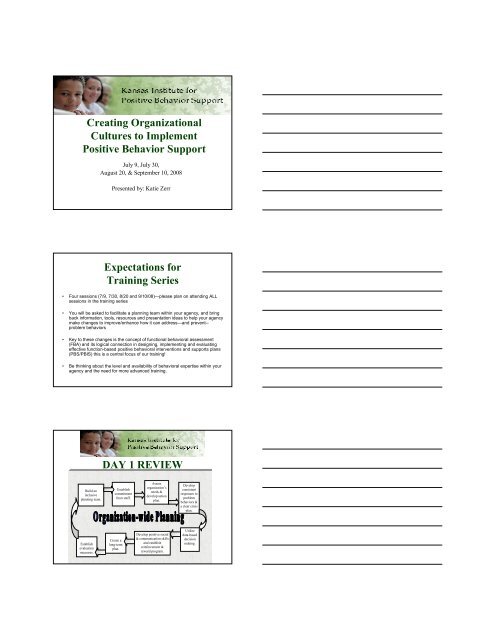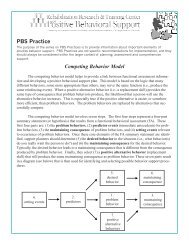the Day 4 Presentation - PBS Kansas
the Day 4 Presentation - PBS Kansas
the Day 4 Presentation - PBS Kansas
Create successful ePaper yourself
Turn your PDF publications into a flip-book with our unique Google optimized e-Paper software.
Creating Organizational<br />
Cultures to Implement<br />
Positive Behavior Support<br />
July 9, July 30,<br />
August 20, & September 10, 2008<br />
Presented by: Katie Zerr<br />
Expectations for<br />
Training Series<br />
• Four sessions (7/9, 7/30, 8/20 and 9/10/08)—please plan on attending ALL<br />
sessions in <strong>the</strong> training series<br />
• You will be asked to facilitate a planning team within your agency, and bring<br />
back information, tools, resources and presentation ideas to help your agency<br />
make changes to improve/enhance how it can address—and prevent--<br />
problem behaviors<br />
• Key to <strong>the</strong>se changes is <strong>the</strong> concept of functional behavioral assessment<br />
(FBA) and its logical connection in designing, implementing and evaluating<br />
effective function-based positive behavioral interventions and supports plans<br />
(<strong>PBS</strong>/PBIS) this is a central focus of our training!<br />
• Be thinking about <strong>the</strong> level and availability of behavioral expertise within your<br />
agency and <strong>the</strong> need for more advanced training.<br />
DAY 1 REVIEW<br />
Build an<br />
inclusive<br />
planning team.<br />
Establish<br />
commitment<br />
from staff.<br />
Assess<br />
organization’s<br />
needs &<br />
develop action<br />
plan.<br />
Develop<br />
consistent<br />
responses to<br />
problem<br />
behaviors &<br />
a clear crisis<br />
plan.<br />
Establish<br />
evaluation<br />
measures.<br />
Create a<br />
long-term<br />
plan.<br />
Develop positive social<br />
& communication skills<br />
and establish<br />
reinforcement &<br />
reward program.<br />
Utilize<br />
data-based<br />
decision<br />
making.
DAY 2 REVIEW<br />
• Critical Features of Positive Behavior Support<br />
• Principles for Prevention<br />
• Key Tenets of Behavior<br />
• Functional Behavior Assessment Process<br />
– through Hypo<strong>the</strong>sis Statements<br />
DAY 3 REVIEW<br />
Completing <strong>the</strong> steps of functional assessment<br />
4. Build a “Competing Behavior Pathway” to identify<br />
possible elements of a Behavior Support Plan<br />
5. Design a Behavior Support Plan<br />
6. Plan for effective implementation of <strong>the</strong> Behavior<br />
Support Plan<br />
7. Monitor regularly and modify based on observed<br />
progress (DAY 4)<br />
Objectives for Training<br />
• Describe how organizations can develop a systematic<br />
process to prevent problem behaviors across service<br />
settings<br />
• Summarize <strong>the</strong> functional behavioral assessment<br />
(FBA) process and how to implement functionbased,<br />
positive behavioral interventions and supports<br />
(PBIS/<strong>PBS</strong>)<br />
• Outline organizational planning actions that your<br />
agency will take to build an effective process for<br />
conducting FBAs and implementing function-based<br />
<strong>PBS</strong> plans for <strong>the</strong> individuals you serve.
DAY 4 OBJECTIVES<br />
• Continue to assess <strong>the</strong> planning team process<br />
• Discuss how <strong>the</strong> Functional Assessment process and<br />
Positive Behavior Supports fit within a Person<br />
Centered Planning model.<br />
• Evaluate an adult case study using <strong>the</strong> PC-<strong>PBS</strong><br />
Checklist.<br />
• Learn about additional data collection methods.<br />
• Consider ways to use information from functional<br />
assessment to improve staff training.<br />
Reporting progress<br />
• Organizational planning: Where are you in <strong>the</strong> process?<br />
– Complete <strong>the</strong> Organization-wide Planning Checklist<br />
• Staff training: How has training for staff been planned?<br />
• Long-term Action Planning: Has your organization developed a<br />
guide to facilitate change over time (3-Year Plan)?<br />
• FBA Process: To what extent can <strong>the</strong> materials and information<br />
from training be integrated into what you are already doing<br />
within your organization?<br />
• Person Centered Planning: What would a Person Centered Plan<br />
look like for yourself or a team member?<br />
Person-Centered Planning<br />
• Unifies a team around <strong>the</strong> focus person’s vision for a<br />
better life<br />
• Creates a plan based on <strong>the</strong> desires of <strong>the</strong> focus person<br />
• Includes strategies to increase quality of life,<br />
relationships & activities<br />
• Builds on strengths, priorities, values & preferences
Person-Centered Planning vs.<br />
Intervention Planning<br />
• Traditional approaches focused on “repairing”<br />
problems in order to create access to community life.<br />
“As soon as she can control her behavior, she can…”<br />
• Professional-driven models targeted changes and<br />
individual needed to complete in order to “fit” into<br />
society ra<strong>the</strong>r than fostering choises that improve<br />
quality of life<br />
• Shift to support oriented and strengths-based approach<br />
Person-Centered<br />
Planning Process<br />
Person-Centered Planning…<br />
• Behavioral intervention works from <strong>the</strong> outside in,<br />
considering adjustments to <strong>the</strong> environment and<br />
relationships before addressing <strong>the</strong> need for<br />
behavior change.<br />
• Through this process, <strong>the</strong> intensity of <strong>the</strong> behavior may<br />
decrease without <strong>the</strong> need for formal intervention.
Activity:<br />
Discuss PCP Models<br />
• Consider commonly used PCP models<br />
– Used to develop familiarity and establish long-term vision<br />
• Personal Futures Planning (PFP)<br />
• Essential Lifestyle Planning (ELP)<br />
– Used to create specific goals in a certain time frame<br />
• McGill Action Planning System (MAPS)<br />
• Planning Alternatives for Tomorrow with Hope (PATH)<br />
• Consider your current PCP Model…<br />
Personal Futures Planning<br />
QuickTime and a<br />
TIFF (LZW) decompressor<br />
are needed to see this picture.<br />
The team also develops a<br />
visual for:<br />
• Relationships<br />
• Places<br />
• Preferences<br />
• Future Vision and Goals<br />
Essential Lifestyle Planning<br />
• “A Plan is not an Outcome” from Listen,<br />
Learn, Act<br />
Michael Smull, 2000
What’s in a MAP?<br />
The facilitator asks <strong>the</strong> team eight questions.<br />
1) What is a MAP?<br />
2) What is <strong>the</strong> person's history or story?<br />
3) What are <strong>the</strong> person's dreams?<br />
4) What are <strong>the</strong> person's nightmares?<br />
5) Who is <strong>the</strong> person?<br />
6) What are <strong>the</strong> person's strengths, gifts, and talents?<br />
7) What does <strong>the</strong> person need?<br />
8) What is <strong>the</strong> plan of action?<br />
MAPS<br />
PATH
PATH<br />
Why PCP & <strong>PBS</strong>?<br />
• A combination provides a multi-component<br />
approach for reducing problem behavior while<br />
improving <strong>the</strong> quality of an individual's life.<br />
• In a 1999 review of published research studies, it<br />
was found that in cases where <strong>PBS</strong> strategies were<br />
used, <strong>the</strong>re had been as much as an 80% reduction<br />
in challenging behavior for approximately twothirds<br />
of <strong>the</strong> behavioral outcomes that were studied.<br />
Carr, et al., 1999<br />
Person-Centered Planning &<br />
Positive Behavior Supports<br />
• Creating a Vision<br />
• Building a Team<br />
• Ga<strong>the</strong>ring Information<br />
• Conducting FBA<br />
• Planning Multi-component supports<br />
• Evaluating <strong>the</strong> Outcomes<br />
• Changing <strong>the</strong> System
The PC-<strong>PBS</strong> Checklist<br />
• The 68 item PC-<strong>PBS</strong> checklist is used to evaluate<br />
plans for billed cases through KI<strong>PBS</strong> Facilitators.<br />
• The checklist is made up of combined elements<br />
from required PCP items and <strong>PBS</strong> items.<br />
• There are 28 PCP Items and 26 <strong>PBS</strong> items<br />
• The o<strong>the</strong>r items involve continued evaluation of<br />
<strong>the</strong> developed interventions and <strong>the</strong> impact of <strong>the</strong><br />
plan on <strong>the</strong> individual’s quality of life.<br />
CASE STUDY<br />
• Using <strong>the</strong> checklists, evaluate <strong>the</strong> case study.<br />
• NOTE: This is not a perfect plan, but was<br />
submitted for KI<strong>PBS</strong> facilitator billing.<br />
Additional Methods for<br />
Data Collection<br />
• How could current data collection methods be<br />
improved within your organization or agency?<br />
• What tools are available to staff?<br />
• How is data shared in <strong>the</strong> intervention planning<br />
process?
Benefits of Graphing<br />
Insert Behavior chart<br />
Functional Assessment &<br />
Staff Training<br />
• A variety of tools and resources are available<br />
depending on <strong>the</strong> needs of your staff.<br />
• KI<strong>PBS</strong> Facilitator Training Application Info<br />
• For more information, go to: www.kipbs.org<br />
• Go to <strong>the</strong> Training<br />
– “Opportunities” &<br />
– “Applications” Links<br />
EVALUATION<br />
• Your input and ideas are very important to<br />
our training system.<br />
• Please take a few minutes to complete <strong>the</strong><br />
two-page evaluation.<br />
• THANK YOU!!!



